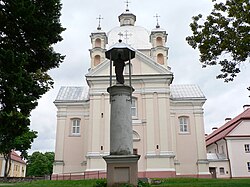Liškiava: Difference between revisions
infobox, expanded |
mound -> hillfot |
||
| Line 47: | Line 47: | ||
A leisure boat route connects Liškiava with [[Druskininkai]], a few kilometres south along the river. |
A leisure boat route connects Liškiava with [[Druskininkai]], a few kilometres south along the river. |
||
[[Image:Liskiava Neman.jpg|thumb|right|200px|Neman and Liškiava seen from the |
[[Image:Liskiava Neman.jpg|thumb|right|200px|Neman and Liškiava seen from the hillfort]] |
||
==History== |
==History== |
||
Revision as of 15:45, 16 May 2008
Liškiava | |
|---|---|
Town | |
 Liškiava church | |
| Country | |
| Ethnographic region | Dzūkija |
| County | Alytus County |
| Municipality | Varėna district municipality |
| Elderate | Merkinė elderate |
| First mentioned | 1044 |
| Population (2005) | |
| • Total | 37 |
| Time zone | UTC+2 (EET) |
| • Summer (DST) | UTC+3 (EEST) |
| Website | http://www.liskiava.lt |
Liškiava is a historic town in Varėna district in Lithuania situated on the bank of Neman River [Lith. Nemunas], near the Liškiavis lake.
A leisure boat route connects Liškiava with Druskininkai, a few kilometres south along the river.

History
First mentioned in annals in 1044, as a castle was built on piliakalnis by the River Neman. It is believed that the castle in the Yotvingian territory was built by Lithuanian Duke Erdvilas. At the end of the 14th century Vytautas the Great erected a stone castle on the hill. Building ceased after the Battle of Grunwald and it was never completed; only the ruins of one tower remains today.
Since the second half of 16th century until 1624 Liškiava church belonged to reformats. 1677 the wooden church was rebuilt, and in 1697 the whole town was donated to Dominican Order. In 1699-1741 a Dominican monastery was built in Liškiava, and 1704–1720 a brick Holy Trinity church. After the Partitions of Polish-Lithuanian Commonwealth in 1795 it was forbidden to accept new monks to monastery. Since 1852 monastery weas rebuilt into living quarters and parsonage. After World War II the building became a school. 1947-1977 it was a recreational base of sartorial factory Lelija.
The Jewish population of Liskova was 146 in 1923. The rabbi of Liskova's Jews before WWII was Rabbi Avraham Tzvi Weinstein (later of London).
Demographics
In 2005 there were 37 people living in Liškiava.
External links
JewishGen Locality Page - Liškiava, Lithuania
